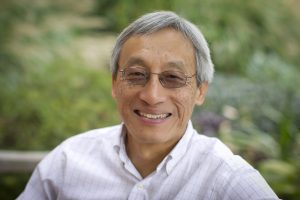The American Association for the Advancement of Science has named Channing Der, PhD, the Sarah Graham Kenan Distinguished Professor of Pharmacology and member of the UNC Lineberger Comprehensive Cancer Center, as an AAAS Fellow.

The honor recognizes Der’s “distinguished contributions to the field of cancer research through the discovery of RAS in cancer and the elucidation of RAS oncoprotein function and therapies.”
This year, the association awarded this honor to 443 members because of their scientifically or socially distinguished efforts to advance science or its applications. Association members bestow this honor on their peers.
New Fellows will be presented with an official certificate and a gold and blue — representing science and engineering, respectively — rosette pin on Feb. 15, 2020, from 8 a.m. to 10 a.m. Pacific Time at the AAAS Fellows Forum during the 2020 AAAS Annual Meeting in Seattle, Washington.
This year’s AAAS Fellows will be formally announced in the AAAS “News & Notes” section of the journal Science on Friday, Nov. 29.
Der’s Honors and Achievements
Der, who joined the UNC School of Medicine in 1992 as an associate professor, received his doctorate from the University of California, Irvine, and he then completed his postdoctoral studies at Harvard Medical School/Dana-Farber Cancer Institute.
His research has centered on the study of the RAS oncogene and cancer and has been funded by grants from the National Cancer Institute (NCI), Lustgarten Foundation, and the Pancreatic Cancer Action Network.
He has authored more than 330 publications and holds six patents. He has mentored more than 50 postdoctoral fellows and 30 pre-doctoral scientists, and is the current director of the National Cancer Institute (NCI) T32 Integrated Training in Cancer Model Systems training program for postdoctoral fellows at UNC Lineberger.
Der, who was a member of the NCI Board of Scientific Counselors, is a member of the NCI RAS Working Group and serves on the scientific advisory boards of the Pancreatic Cancer Action Network and Mirati Therapeutics.
He has served on numerous editorial boards and as a consultant for numerous pharmaceutical/biotech companies. He is current board member and past president of the Cancer Biology and Training Consortium.
His honors include being the recipient of an NCI Outstanding Investigator Award; the Hyman L. Battle Distinguished Cancer Research Award; the University of California, Irvine, Distinguished Alumnus Award; the UNC Mentorship Award for Lifetime Achievement; and the Einstein BIH Visiting Fellow Award.
Recently, his lab discovered an approach to make pancreatic cancer cells reliant on one energy source and then starve them of it, a finding that has led to clinical studies of a new treatment strategy for one of the most deadly forms of cancer.
AAAS Fellows
Two other UNC-Chapel Hill faculty were also named AAAS Fellows:
Kathleen Mullen Harris, PhD, the James E. Haar Distinguished Professor of Sociology in the UNC College of Arts and Sciences and member of the Carolina Population Center, was named AAAS fellow for “distinguished contributions to the field of social demography, particularly for research and data generation in relation to genetic aspects of health and social behavior.”
Karin Pfennig, PhD, professor of biology in the UNC College of Arts and Sciences, was selected for “research on the role of behavior in adaptation and biodiversity, particularly on the importance of understanding the role of hybridization under changing climatic regimes.”
The tradition of AAAS Fellows began in 1874. Currently, members can be considered for the rank of Fellow if nominated by the steering groups of the association’s 24 sections, or by any three Fellows who are current AAAS members (so long as two of the three sponsors are not affiliated with the nominee’s institution), or by the AAAS chief executive officer.
Fellows must have been continuous members of AAAS for four years by the end of the calendar year in which they are elected. The AAAS Fellow honor comes with an expectation that recipients maintain the highest standards of professional ethics and scientific integrity.
Each steering group reviews the nominations of individuals within its respective section and a final list is forwarded to the AAAS Council, which votes on the aggregate list.
The Council is the policy-making body of the Association, chaired by the AAAS president, and consisting of the members of the board of directors, the retiring section chairs, delegates from each electorate and each regional division, and two delegates from the National Association of Academies of Science.
AAAS encourages its sections and Council to consider diversity among those nominated and selected as Fellows, in keeping with the association’s commitment to diversity, equity and inclusion.
About AAAS
The American Association for the Advancement of Science (AAAS) is the world’s largest general scientific society and publisher of the journal Science, as well as Science Translational Medicine; Science Signaling; a digital, open-access journal, Science Advances; Science Immunology; and Science Robotics. AAAS was founded in 1848 and includes more than 250 affiliated societies and academies of science, serving 10 million individuals. Science has the largest paid circulation of any peer-reviewed general science journal in the world. The nonprofit AAAS is open to all and fulfills its mission to “advance science and serve society” through initiatives in science policy, international programs, science education, public engagement, and more. For additional information about AAAS, see www.aaas.org.
